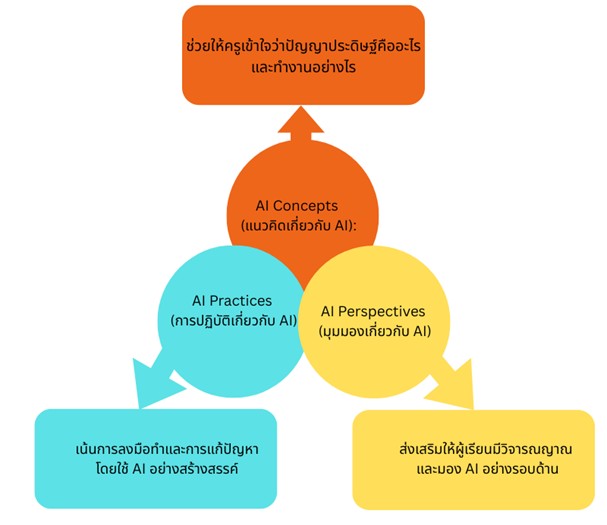Developing Teachers’ Skills and Applying Artificial Intelligence (AI) in Educational Management, of School Teacher in Khon Buri District under Nakhonratchasima Primary Educational Service Area Office 3
Main Article Content
Abstract
This study aimed to (1) investigate the current problems and conditions of artificial intelligence (AI) skills development and application in educational management among school teachers in Khon Buri District under Nakhon Ratchasima Primary Educational Service Area Office 3, (2) develop AI skills and applications for educational management among school teachers, and (3) examine satisfaction levels regarding AI skills development and application in educational management among school teachers. This quasi-experimental research involved teachers from medium-sized and large schools under the Nakhon Ratchasima Primary Educational Service Area Office 3 in Nakhon Ratchasima Province. From a total of 10 schools, 5 schools were selected through multi-stage random sampling, yielding 60 participants. Ultimately, 30 participants were chosen for the study through random sampling. The research instruments comprised: (1) a questionnaire assessing current problems, knowledge, and technical skills in using AI tools to support teaching and learning among teachers for AI skills development and application in educational management, (2) AI application media, (3) a practical skills test measuring AI skills and applications with a reliability coefficient of 0.82, (4) lesson plans, and (5) a satisfaction questionnaire. Data analysis employed descriptive statistics, including percentages, means, standard deviations, and dependent t-tests. The research findings revealed that: 1) The overall level of problems regarding AI skills development and application for educational management in schools within Khon Buri District was high; 2) the results of AI skills development and application, as well as achievement outcomes for educational management, showed that teachers' overall pre-training and post-training practical test scores demonstrated statistically significant improvement at the .05 level; and 3) teachers' satisfaction with AI skills development and application for educational management was overall at a high level.
Article Details

This work is licensed under a Creative Commons Attribution-NonCommercial-NoDerivatives 4.0 International License.
References
ชัชพงศ์ สร้อยแสง, จิราภรณ์ หันตุลา และ สุวรรณี อัศวกุลชัย. (2567). การพัฒนาผลสัมฤทธิ์ทางการเรียนและทักษะการใช้เทคโนโลยีปัญญาประดิษฐ์เพื่อพัฒนาการเรียนรู้และความเสมอภาคทางการศึกษาของครูและบุคลากรทางการศึกษา สำนักงานส่งเสริมการเรียนรู้ประจำจังหวัดจันทบุรี. วารสารนวัตกรรมการบริหารและการจัดการศึกษา, 2(3), 48–56.
ณัทตรัยพัทธ์ ภัทร์พรชนัต. (2568). โอกาสและความท้าทายด้านจริยธรรมสื่อดิจิทัลในยุคปัญญาประดิษฐ์. วารสารรัชต์ภาคย์, 19(62), 547-558.
ธงชัย สิทธิกุล. (2566). การเรียนรู้รายบุคคลในยุคดิจิทัล. กรุงเทพฯ: จุฬาลงกรณ์มหาวิทยาลัย.
น้ำทิพย์ เสมอเชื้อ. (2567). อนาคตและความท้าทายของการพัฒนานวัตกรรมภาครัฐและการบริหารงานโดยใช้ปัญญาประดิษฐ์. พะเยา: สถาบัน AIGC มหาวิทยาลัยพะเยา.
พิชญุตม์ มีเครือ, สุชาดา นันทะไชย และ พร้อมพิไล บัวสุวรรณ. (2568). การศึกษาความสัมพันธ์ระหว่างภาวะผู้นำดิจิทัลกับการส่งเสริมความตระหนักรู้จริยธรรมปัญญาประดิษฐ์ในโรงเรียนขนาดใหญ่พิเศษแห่งหนึ่งในกรุงเทพมหานคร. วารสารวิชาการ วิจัย และนวัตกรรม มสธ. (มนุษยศาสตร์และสังคมศาสตร์), 5(1), 35–50.
รัตนะ บัวสนธ์. (2562). การวิจัยและพัฒนานวัตกรรมการศึกษา. กรุงเทพฯ: จุฬาลงกรณ์มหาวิทยาลัย.
วิรัตน์ ภารตระศรี, ยงยุทธ ศรีสวัสดิ์ และ ชัญญณัท กริ่มใจ. (2567). ปัจจัยที่มีผลต่อความพึงพอใจของบุคลากรในการนําปัญญาประดิษฐ์ด้านการตลาดเข้ามาใช้ในองค์กรในเขตอําเภอเมือง จังหวัดระยอง. Journal of Nakhonratchasima College (Humanities and Social Sciences), 18(3), 164-174.
สำนักงานเขตพื้นที่การศึกษามัธยมศึกษา. (2565). แผนพัฒนาการศึกษาขั้นพื้นฐาน พ.ศ. 2566–2570 ของสำนักงานเขตพื้นที่การศึกษามัธยมศึกษาตาก. สืบค้นจาก https://www.secondarytak.go.th/wp-content/uploads/2022/12/แผนพัฒนาการศึกษาขั้นพื้นฐาน-2566-2570-ของ-สพฐ.pdf.
สำนักงานคณะกรรมการการอุดมศึกษา. (2567). รายงานการพัฒนาสมรรถนะดิจิทัลในสถาบันอุดมศึกษา. กรุงเทพฯ: สำนักงานคณะกรรมการการอุดมศึกษา.
สำนักงานปลัดกระทรวงการอุดมศึกษาวิทยาศาสตร์ วิจัยและนวัตกรรม. (2565). ยุทธศาสตร์การพัฒนาปัญญาประดิษฐ์เพื่อการศึกษา. กรุงเทพฯ: กระทรวงการอุดมศึกษาวิทยาศาสตร์ วิจัยและนวัตกรรม.
สำนักงานพัฒนาวิทยาศาสตร์และเทคโนโลยีแห่งชาติ. (2564). แนวปฏิบัติด้านจริยธรรมปัญญาประดิษฐ์ของประเทศไทย (Thailand AI Ethics Guideline). สืบค้นจาก https://op.mahidol.ac.th/ra/contents/research_regulation/AI-ETHICS_NSTDA.pdf.
สำนักงานพัฒนาวิทยาศาสตร์และเทคโนโลยีแห่งชาติ. (2567). รายงานแนวโน้มเทคโนโลยีปัญญาประดิษฐ์. นนทบุรี: สำนักงานพัฒนาวิทยาศาสตร์และเทคโนโลยีแห่งชาติ.
สุทัศน์ กำมณี, ณรงค์เดช รัตนานนท์เสถียร และขวัญนรี กล้าปราบโจร. (2566). การพัฒนารูปแบบเพื่อเพิ่มทักษะด้านการใช้งานปัญญาประดิษฐ์ในการเพิ่มมูลค่าให้กับงาน และความสามารถในการทำงานของแรงงานจังหวัดกาญจนบุรี วารสารนวัตกรรมการบริหารและการจัดการ มหาวิทยาลัยเทคโนโลยีราชมงคลรัตนโกสินทร์, 11(1), 45-53.
Anthropic. (2024). The Claude 3 Model Family: Opus, Sonnet, Haiku. Retrieved from https://assets.anthropic.com/m/61e7d27f8c8f5919/original/Claude-3-Model-Card.pdf.
Likert, R. (1961). New Patterns of Management. New York: McGraw – Hill.
May, T. (1997). Social research: Issues, methods and process. (2nd ed.). London: Open University Press.
McKinsey & Company. (2024). Global AI investment trends and perspectives. Retrieved from https://www.mckinsey.com/.
Panadero, E., Jonsson, A., Pinedo, L., & Fernández-Castilla, B. (2023). Effects of rubrics on academic performance, self-regulated learning, and self-efficacy: A meta-analytic review. Educational Psychology Review, 35(4), 113.
Su, J., Ng, D. T. K., & Chu, S. K. W. (2023). Artificial intelligence (AI) literacy in early childhood education: The challenges and opportunities. Computers and Education: Artificial Intelligence, 4, 100124.
The Equitable Education Fund (EEF). (2023). Empowering Teaching and Learning through AI, EEF. Retrieved from https://en.eef.or.th/2023/10/02/empowering-teaching-and-learning-through-ai/.
UNESCO. (2019). Artificial Intelligence (AI) in Education: Challenges and Opportunities for Sustainable Development. Retrieved from https://www.gcedclearinghouse.org/sites/default/files/resources/190175eng.pdf.
UNESCO. (2023). Ethical guidelines for artificial intelligence development. Retrieved from https://www.unesco.org/.
Unite.AI. (2025). 10 best AI tools for education. Retrieved from https://www.unite.ai/10-best-ai-tools-for-education/.
Wilson, G., Johnson, O., & Brown, W. (2024). The impact of artificial intelligence on digital marketing strategies. Retrieved from https://www.preprints.org/manuscript/202408.0276/v1.
World Economic Forum. (2023). AI transforming global industries: A comprehensive report. Retrieved from https://www.weforum.org/.
Xu, Z. (2024). AI in education: Enhancing learning experiences and student outcomes. Applied and Computational Engineering, 51(1), 104–111.

